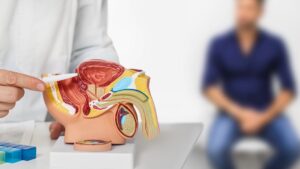
In “Erectile Dysfunction and Sexual Health,” you will explore the common issue of erectile dysfunction and its impact on sexual health. This article provides insights into both the physical and psychological causes of erectile dysfunction, highlighting the importance of open communication with healthcare providers and partners. Additionally, it explores various treatment options available to address this issue, offering guidance to those seeking solutions and support in navigating this sensitive topic. Join us as we navigate the complexities of erectile dysfunction and discover ways to enhance overall sexual well-being.

Understanding Erectile Dysfunction
Erectile dysfunction (ED) is a condition characterized by the inability to achieve or maintain an erection sufficient for sexual intercourse. It is a common issue that can affect men of all ages, although it becomes more prevalent as men get older. ED can have both physical and psychological causes, and its effects go beyond the bedroom, impacting a man’s overall sexual health and well-being.
Definition of Erectile Dysfunction
Erectile dysfunction is defined as the persistent inability to achieve or maintain an erection that is firm enough for sexual intercourse. This can include difficulties with getting an erection, maintaining it, or both. It is important to note that occasional difficulties with achieving or maintaining an erection are not necessarily indicative of erectile dysfunction. However, when the issue becomes chronic and consistently affects a man’s sexual performance, it may be a sign of ED.
Prevalence Rates
Erectile dysfunction is a widespread issue, with prevalence rates varying depending on age and other factors. It is estimated that approximately 40% of men over the age of 40 experience some degree of erectile dysfunction, and the prevalence increases with age. By the age of 70, it is estimated that around 70% of men will have experienced some form of erectile dysfunction.
Causes of Erectile Dysfunction
Erectile dysfunction can have both physical and psychological causes. Physical causes include cardiovascular diseases such as high blood pressure and atherosclerosis, diabetes, hormonal imbalances, neurological disorders, and obesity. Psychological causes can include stress and anxiety, depression, relationship problems, and performance anxiety.

Physical Causes of Erectile Dysfunction
Cardiovascular Diseases: Cardiovascular diseases can restrict blood flow to the penis, making it difficult to achieve or maintain an erection. Conditions such as high blood pressure, atherosclerosis, and heart disease can contribute to erectile dysfunction.
Diabetes: Diabetes can damage blood vessels and nerves, leading to reduced blood flow and sensation in the penis. This can result in difficulties with achieving or maintaining an erection.
Hormonal Imbalances: Hormonal imbalances, especially low levels of testosterone, can contribute to erectile dysfunction. Testosterone is essential for maintaining libido and erectile function.
Neurological Disorders: Conditions such as multiple sclerosis, Parkinson’s disease, and stroke can interfere with the proper functioning of the nerves that control erections.
Obesity: Obesity can lead to various health issues, including diabetes, cardiovascular diseases, and hormonal imbalances, all of which can contribute to erectile dysfunction.
Psychological Causes of Erectile Dysfunction
Stress and Anxiety: High levels of stress and anxiety can interfere with the sexual arousal process and inhibit the ability to achieve or maintain an erection.
Depression: Depression can affect both the desire for sex and the ability to perform sexually. The loss of interest in pleasurable activities, low self-esteem, and fatigue associated with depression can contribute to erectile dysfunction.
Relationship Problems: Relationship issues, such as communication problems, conflicts, or lack of emotional intimacy, can contribute to erectile dysfunction. Stress within a relationship can make it difficult to relax and enjoy sexual activity.
Performance Anxiety: Fear of performance failure or concerns about satisfying a partner can create anxiety around sexual performance, making it difficult to achieve or maintain an erection.

Risk Factors for Erectile Dysfunction
Age: As men get older, the risk of developing erectile dysfunction increases. This is primarily due to the natural aging process, which can lead to the deterioration of blood vessels and nerve function.
Smoking: Smoking damages blood vessels and reduces blood flow throughout the body, including to the penis. This can contribute to erectile dysfunction.
Alcohol Consumption: Excessive alcohol consumption can interfere with the body’s ability to achieve and maintain an erection. It can also contribute to psychological factors such as anxiety and depression.
Drug Use: Illicit drug use, especially narcotics and certain medications, can contribute to erectile dysfunction.
Certain Medications: Some medications, such as those used to treat high blood pressure, depression, and prostate conditions, can have side effects that contribute to erectile dysfunction.
Effects of Erectile Dysfunction on Sexual Health
Intimacy Issues: Erectile dysfunction can create difficulties in establishing and maintaining intimate relationships. It can lead to feelings of frustration and disconnection from a partner.
Self-esteem and Confidence: A man’s self-esteem and confidence can be greatly affected by erectile dysfunction. The inability to perform sexually can lead to feelings of inadequacy and a negative self-image.
Relationship Strain: Erectile dysfunction can strain relationships, causing tension and frustration between partners. It may lead to a decrease in intimacy and affect overall relationship satisfaction.
Emotional Distress: The psychological impact of erectile dysfunction can result in emotional distress such as anxiety, depression, and feelings of worthlessness. It can affect a man’s overall well-being and quality of life.
Diagnostic Process for Erectile Dysfunction
Medical History: A healthcare provider will typically ask about your medical history, including any underlying health conditions, medications you are currently taking, and any previous surgeries or treatments.
Physical Examination: A physical examination may be conducted to assess your overall health and identify any physical factors that may be contributing to erectile dysfunction.
Laboratory Tests: Blood tests can be done to check hormone levels, cholesterol levels, blood sugar levels, and determine if there are any underlying medical conditions contributing to erectile dysfunction.
Psychological Evaluation: In some cases, a psychological evaluation may be conducted to assess the presence of any psychological factors contributing to erectile dysfunction.
Treatment Options for Erectile Dysfunction
Oral Medications: Oral medications such as Viagra, Cialis, and Levitra are commonly prescribed to help improve erectile function. These medications work by increasing blood flow to the penis, enabling a man to achieve and maintain an erection.
Injection Therapies: Injection therapies involve injecting medication directly into the side of the penis to stimulate an erection. This method can be effective for men who do not respond well to oral medications.
Vacuum Erection Devices: Vacuum erection devices create a vacuum around the penis, drawing blood into the organ and causing an erection. They can be used as a non-invasive treatment option for erectile dysfunction.
Penile Implants: For severe cases of erectile dysfunction that do not respond to other treatments, penile implants may be considered. These are surgically implanted devices that allow a man to achieve an erection by inflating and deflating them as needed.
Psychological Counseling: In cases where psychological factors are contributing to erectile dysfunction, counseling and therapy can be beneficial. Working with a therapist can help address underlying issues and improve sexual performance.
Lifestyle Changes for Erectile Dysfunction
Healthy Diet: A healthy diet that includes fruits, vegetables, whole grains, lean proteins, and limited saturated fats can contribute to overall cardiovascular health and improve erectile function.
Regular Exercise: Regular physical activity, such as walking, jogging, or swimming, can improve cardiovascular health, reduce weight, and enhance overall sexual function.
Smoking Cessation: Quitting smoking can improve blood flow and cardiovascular health, reducing the risk of erectile dysfunction.
Moderate Alcohol Consumption: Limiting alcohol consumption to moderate levels can help reduce the risk of erectile dysfunction. Excessive alcohol can interfere with sexual function.
Stress Management: Developing healthy coping mechanisms and stress management techniques, such as meditation, deep breathing exercises, or engaging in hobbies, can help reduce stress and anxiety, which can contribute to erectile dysfunction.
Importance of Open Communication
Talking to Healthcare Providers: Discussing erectile dysfunction with a healthcare provider is crucial. They can provide medical advice, diagnose any underlying conditions, and recommend appropriate treatment options.
Discussing with Partners: Openly communicating with your partner about erectile dysfunction can help alleviate stress and reduce emotional strain. Sharing concerns, fears, and expectations can strengthen the relationship and promote mutual support.
Addressing Emotional Concerns: Emotional concerns related to erectile dysfunction should not be overlooked. Seeking emotional support through therapy or counseling can help address emotional distress and improve overall well-being.
Exploring Treatment Options: Being open to exploring different treatment options and discussing them with healthcare providers can lead to a personalized and effective approach to managing erectile dysfunction.
Support for Individuals with Erectile Dysfunction
Support Groups: Joining support groups specifically designed for individuals with erectile dysfunction can provide a platform for sharing experiences, seeking advice, and finding emotional support.
Online Resources: There are various online resources, forums, and websites dedicated to erectile dysfunction that provide information, tips, and opportunities for discussion.
Therapy and Counseling: Individual or couples therapy can be beneficial in addressing the emotional and relational aspects of erectile dysfunction. A trained therapist can provide guidance and support for individuals and couples dealing with this issue.
Education and Awareness: Educating oneself and others about erectile dysfunction can help reduce stigma and increase understanding. Awareness campaigns and educational initiatives can promote conversations and destigmatize the condition.
In conclusion, understanding erectile dysfunction is essential for individuals and their partners. By recognizing the potential causes, seeking assistance, and exploring treatment options, those affected by this condition can regain their sexual health and overall well-being. Open communication with healthcare providers, partners, and support networks is instrumental in addressing the physical and psychological aspects of erectile dysfunction. With knowledge, support, and appropriate treatment, individuals can overcome the challenges of erectile dysfunction and lead fulfilling, satisfying lives.



